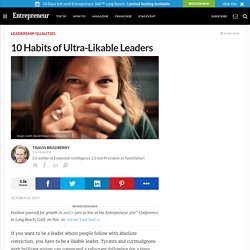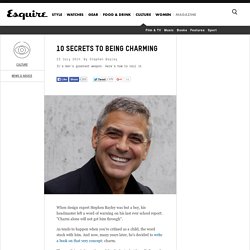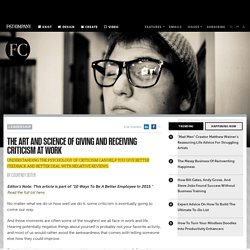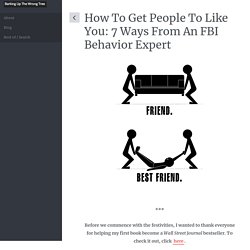

9 Phrases Smart People Never Use in Conversation. 10 Habits of Ultra-Likable Leaders. Reader Resource Position yourself for growth in 2017—join us live at the Entrepreneur 360™ Conference in Long Beach, Calif. on Nov. 16.

Secure Your Seat » 10 Secrets To Being Charming. When design expert Stephen Bayley was but a boy, his headmaster left a word of warning on his last ever school report: "Charm alone will not get him through".

As tends to happen when you're critised as a child, the word stuck with him. And now, many years later, he's decided to write a book on that very concept: charm. The result is a informative and fun look at what he calls "one of life’s most desirable assets" , looking at its orgins and meaning throughout history. Here for Esquire, Bayley condenses charm down to 10 basic rules of thumb, so you too can get away with murder. 1 | Treat every single person you meet as if you have been given secret information that they will soon inherit an unwholesomely large fortune. 2 | Wear good shoes. 3 | Don't tell jokes, but laugh at everybody else's. 4 | Be curious and inquisitive, but not intrusive. 5 | Being charming is not all about sex, but quite a lot of it is.
The Key to Effective Teams in Schools: Emotional Intelligence. I'm going to share one of my greatest discoveries about developing teams.

This understanding has led me to take actions that otherwise would never occur to me when working with groups. I also think it might be one of the keys to building effective teams of educators who can collaborate, learn together, and transform our schools. 12 Habits That Set Ultra Successful People Apart. How Emotional Intelligence Became a Key Leadership Skill. Andrew Nguyen Anyone trying to come up to speed on emotional intelligence would have a pretty easy time of it since the concept is remarkably recent, and its application to business newer still.

The term was coined in 1990 in a research paper by two psychology professors, John D. Mayer of UNH and Peter Salovey of Yale. Some years later, Mayer defined it in HBR this way: Inside Google's Insanely Popular Emotional-Intelligence Course. In 2006, Google engineer Chade-Meng Tan decided he no longer wanted to feel like a cog in the great machine, and set out to create a program that would train people to be more mindful in their lives.

This wasn’t some Kumbaya moment; Tan’s ambitious course would train people to become more aware of their emotions, more compassionate toward others, more able to build sustainable relationships, and, ultimately, able to contribute to world peace. Or at least peace and harmony in the workplace. Tan, who joined Google in 1999 as the company’s employee No. 107, assembled a team that included a few consultants, a Stanford scientist, and Marc Lesser, a zen teacher with an MBA and entrepreneurial experience. The first "Search Inside Yourself" two-day course was taught to Googlers in 2007. It wasn’t long after that the influential curriculum led to Tan’s appointment as Google’s Jolly Good Fellow. So, Bostelmann brought Tan in as a guest speaker, and was amazed by the responses he received. How I approach strangers HONY Brandon Stanton. Signs That You Lack Emotional Intelligence.
Executive Summary Often, emotional intelligence is the key differentiator between a star performer and the rest of the pack, yet many never embrace the skill for themselves.

Do you think being liked at work is overrated? Are you surprised when others are offended by your comments, and do you feel like they’re overreacting? 10 Irritating Behaviors that Will Ruin Your Career. The Art And Science Of Giving And Receiving Criticism At Work. Editor's Note: This article is part of "10 Ways To Be A Better Employee In 2015.

" Read the full list here. No matter what we do or how well we do it, some criticism is eventually going to come our way. And those moments are often some of the toughest we all face in work and life. Hearing potentially negative things about yourself is probably not your favorite activity, and most of us would rather avoid the awkwardness that comes with telling someone else how they could improve. 'Soft Skills' Can Help You Get Ahead. By DENNIS NISHI After working five years as a regional director at a large health insurer in Oakland, Calif., Daniel Eddleman felt ready to move up the ladder.

So he found a mentor within the company who agreed with Mr. Eddleman that his performance and leadership ability merited the promotion. But he'd need to work on a few soft skills to clinch the job. "It can be a challenging environment to get noticed in because it's such a big organization," says Mr. "I realized that I can sometimes come on too strong. Most people are terrible at self-assessment, a core skill that is needed to succeed, says Peggy Klaus, an executive coach from Berkeley, Calif., and author of "Brag! "It's not easy to turn the mirror back on yourself and be absolutely honest," she says. Although hard skills like sales and software knowledge can get you through the door, more companies are asking for soft skills as well from job candidates, finds a recent study by Millennial Branding, a consulting firm in Boston.
WATCH: Why Empathy Is More Powerful Than Sympathy. Why Emotional Intelligence Is Critical to Your Success (Take 15 Series) How To Get People To Like You: 7 Ways From An FBI Behavior Expert. Before we commence with the festivities, I wanted to thank everyone for helping my first book become a Wall Street Journal bestseller.

To check it out, click here. Meeting new people can be awkward.